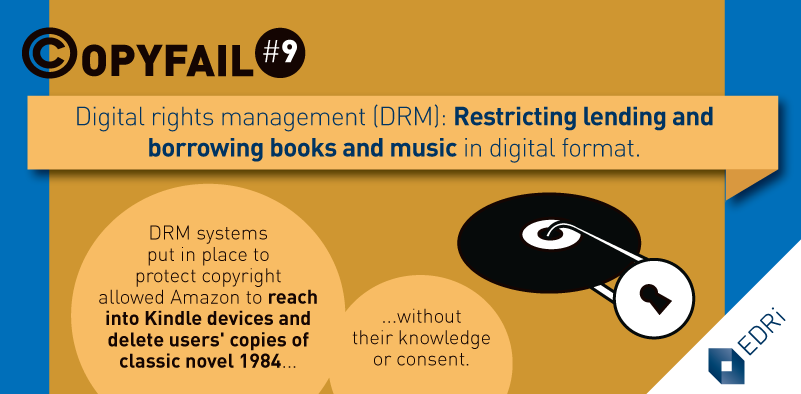Copyfail #9: Digital Rights Management (DRM): Restricting lending and borrowing books and music in digital format
This article is the ninth in the series presenting Copyfails.
The EU is reforming its copyright rules. We want to introduce you to the main failures of the current copyright system, with suggestions on how to fix them. You can find all the Copyfails here.
How has it failed?
We are able to lend book to our friends, make photocopies of its pages, quote parts of the text, or sell our book to a second-hand bookshop. But with digital works like ebooks, CDs, or DVDs, users often face technical restrictions. You cannot lend your ebook to a friend (without lending your e-reader, too), or make a copy of your copy-protected DVD, not even for your own private use. Even if your government says you are allowed to, European and international law says companies are permitted to question it by using “Digital Rights Management” (DRM), software that limits copying.
DRM is a collection of systems used to protect copyright on electronic media, such as digital music and films, as well as computer software. It attempts to control the user’s ability to access, copy, transfer and convert material. Circumventing DRM technologies is forbidden in EU copyright law.
Given the fact that DRM is a blunt tool that does not take into consideration the legal freedoms to use copyrighted works for parody, citation, quotation, private copying and so on, not allowing the circumvention DRM means in practice giving away all those rights. DRM, as a rule, take all of those freedoms from you, in the name of stopping copyright violations.

Why is this important?
If someone puts a lock on something you own, you are not the owner. DRMs are digital locks which are put on your devices without asking your opinion or permission to install them and, even worse, without giving you the key. Copyright experts widely agree that DRM systems don’t achieve their intended purpose; they are bad for society, businesses and artists.
Copyright is supposed to guarantee that artists and creators get paid for their work – that there are incentives to creativity. Copyright should not be used as an excuse to restrict our freedoms or access to knowledge and learning. DRM does not fix the problem it is supposed to fix – unauthorised copying and exchanging of ebooks, music, and videos – and it adds unnecessary restrictions on legally acquired content.
How to fix it?

Read more:
Amazon Erases Orwell Books From Kindle (17.07.2009)
http://www.nytimes.com/2009/07/18/technology/companies/18amazon.html
DRM Frequently Asked Questions
https://www.defectivebydesign.org/faq
Electronic Frontier Foundation: DRM
https://www.eff.org/issues/drm
Amazon wipes customer’s Kindle and deletes account with no explanation (22.10.2012)
https://www.theguardian.com/money/2012/oct/22/amazon-wipes-customers-kindle-deletes-account
DRM.info
http://drm.info/what-is-drm.en.html

